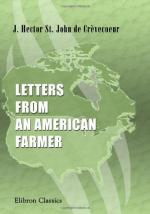sympathetic eyes. All I wish to delineate is,
the progressive steps of a poor man, advancing from
indigence to ease; from oppression to freedom; from
obscurity and contumely to some degree of consequence—not
by virtue of any freaks of fortune, but by the gradual
operation of sobriety, honesty, and emigration.
These are the limited fields, through which I love
to wander; sure to find in some parts, the smile of
new-born happiness, the glad heart, inspiring the
cheerful song, the glow of manly pride excited by
vivid hopes and rising independence. I always
return from my neighbourly excursions extremely happy,
because there I see good living almost under every
roof, and prosperous endeavours almost in every field.
But you may say, why don’t you describe some
of the more ancient, opulent settlements of our country,
where even the eye of an European has something to
admire? It is true, our American fields are in
general pleasing to behold, adorned and intermixed
as they are with so many substantial houses, flourishing
orchards, and copses of woodlands; the pride of our
farms, the source of every good we possess. But
what I might observe there is but natural and common;
for to draw comfortable subsistence from well fenced
cultivated fields, is easy to conceive. A father
dies and leaves a decent house and rich farm to his
son; the son modernises the one, and carefully tills
the other; marries the daughter of a friend and neighbour:
this is the common prospect; but though it is rich
and pleasant, yet it is far from being so entertaining
and instructive as the one now in my view.
I had rather attend on the shore to welcome the poor
European when he arrives, I observe him in his first
moments of embarrassment, trace him throughout his
primary difficulties, follow him step by step, until
he pitches his tent on some piece of land, and realises
that energetic wish which has made him quit his native
land, his kindred, and induced him to traverse a boisterous
ocean. It is there I want to observe his first
thoughts and feelings, the first essays of an industry,
which hitherto has been suppressed. I wish to
see men cut down the first trees, erect their new
buildings, till their first fields, reap their first
crops, and say for the first time in their lives,
“This is our own grain, raised from American
soil—on it we shall feed and grow fat,
and convert the rest into gold and silver.”
I want to see how the happy effects of their sobriety,
honesty, and industry are first displayed: and
who would not take a pleasure in seeing these strangers
settling as new countrymen, struggling with arduous
difficulties, overcoming them, and becoming happy.




